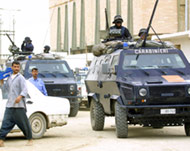Italy extends anti-terrorism powers
The Italian parliament has given final approval to measures that will give the state greater powers to combat terrorism.

The move came on Saturday amid renewed government warnings that Italy faced a grave threat of attacks.
The package makes it easier for police to detain and deport suspects, increases penalties for terrorism-related crimes and gives the green light for greater surveillance of internet and telephone traffic.
“We have before us a grave threat that must be faced with all the means of prevention and opposition that we have, and that we can acquire through this package,” Interior Minister Giuseppe Pisanu told parliament.
He was addressing the Chamber of Deputies before a marathon voting session to ensure the laws were approved this weekend before the summer recess.
Under threat
Italy has not been attacked by militants on its home soil, but after two series of deadly bombings in July on London and then the Egyptian resort Sharm al-Shaikh, most Italians fear it is just a matter of time.
 |
|
Italy has 3000 soldiers in Iraq |
Italy, like Britain, is a close ally of Washington and has sent 3000 troops to Iraq. Officials have boosted security on Italy’s transport system, but menacing internet messages and a series of false threats have left Italians jittery.
The new measures were drawn up after the London attacks and were approved by Prime Minister Silvio Berlusconi’s coalition in a decree last week, but they needed parliament’s backing to keep them in force.
Among measures are new laws expanding the definitions of terrorist training and recruiting and making it illegal to prepare explosives that are then used in attacks or to train people how to use them.
Police will be able to hold detainees for up to 24 hours to confirm their identity, instead of 12, and will be allowed to take saliva samples for DNA tests from suspects under investigation. Previously, DNA tests could be taken only after charges had been brought.
The measures make it easier for police to monitor telephones and the internet and deport foreigners considered a threat to security. The law will allow the authorities to grant residence to illegal immigrants who collaborate with investigators.